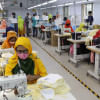Our gender pay gap is fixable

Claudia Goldin, the first female tenured professor in the economics department of Harvard University, was awarded the Nobel Prize in Economics this year. She is the third woman to receive this honour – and the first to not be sharing it with a male researcher. The award recognises her lifelong work examining the wage inequality between men and women, and explaining how women's labour force participation evolves over the different development stages of an economy in interaction with its culture.
The Royal Swedish Academy of Sciences said on October 16 that Goldin's research "provided the first comprehensive account of women's earnings and labour market participation through the centuries" to reveal "the causes of change, as well as the main sources of the remaining gender gap," illuminating the pivotal wage difference that emerges among couples after having the first child.
For the BRAC Institute of Governance and Development (BIGD), women's empowerment and gender equality has always been a central research theme. And the insights we gleaned and the data we collected from more than a decade of work in Bangladesh are clearly aligned with what Goldin has established through her body of research on women's work.
To begin with, the late BIGD researcher Simeen Mahmud, one of the foremost Bangladeshi female social science researchers of her time, used data to show that the vast economic value women create through their unpaid productive and care work is completely unrecognised in their families, the society, and national statistics. Women's childcare responsibility – that is, unpaid work – thus not only creates the gender pay gap by limiting women's ability to employ their time and energy on outside work, as emphasised by Goldin, but when unrecognised as an economic contribution, it keeps them disempowered.
The gender gap in labour market participation has narrowed in Bangladesh over the last half century; however, it is still very wide at 43 percent for women and 81 percent for men, according to the latest Labour Force Survey. It is not unreasonable to assume that women's participation grows as they become more educated and urban, and the country becomes richer. But contrary to this common-sense understanding, in Bangladesh, like in many other developing countries, their participation is higher in villages than in cities and among women with little to no education compared to those with secondary to higher-secondary level education. And the growth in women's labour force participation has also slowed down in recent years after consistently increasing in the 80s and 90s, even though the country's economic growth remains robust. The national surveys and findings from different BIGD studies have repeatedly documented these trends.
These trends are also consistent with Professor Goldin's arguments, based on empirical evidence, regarding women's work in different economic stages of a country. Many women in poor, agricultural societies participate in the labour force out of sheer necessity. As the economy grows and becomes more urban, the better-off conditions of many households may reduce the need for women to work outside; these women may also find it undignified to engage in industrial, poorly paid jobs which are offered in abundance in intermediate economies like Bangladesh. Only when women are highly educated and can find better-paid, professional jobs can they break the norms that want to keep them indoors. This is exactly what BIGD researcher Lopita Haque found in her collaborative study with Naila Kabeer of the London School of Economics and Mahabub Rahman of Comilla University in 2021.
Like Goldin's work, one BIGD study found that the gender wage gap is minimal or non-existent within a specific job and level, but on average, women earn less than men. The conflict between the two findings can be explained by the type of work opportunities available for women due to both gender norms and educational disparities.
Generally, occupations that are typically "feminine" are also considered less prestigious and pay less. As explained, higher education opens up women's world of work, but women in Bangladesh are half as likely to attain tertiary education compared to men.
The first consequence of the social expectations about appropriate jobs for women, often shared by women themselves, is the predominance of home-based, informal, and often unpaid nature of women's work. Going outside and working alongside men is deemed inappropriate by many, especially in professions with lower social status, forcing most Bangladeshi women with some means and some education to find productive work in the confines of home (Haq, et al, 2021). For those who work outside due to necessity, societal norms and their own skill levels narrow down their options. The professional options for women are limited to those deemed suitable for women, like teaching and nursing.
Even in sectors where women dominate the workforce, they struggle to move up the career ladder. The readymade garments (RMG) sector is a case in point. Most women in RMG work on the factory floor while the supervisory and managerial roles are male-dominated. Even when women are qualified, they are frequently turned down frombeing promoted to supervisory roles, primarily because they may not be able to put in the time demanded of the role due to their responsibilities at home. Some even opt out of promotions voluntarily.
This sad reality of women's career trajectories is firmly rooted in society's expectations from women. The survey on time use, by the Bangladesh Bureau of Statistics, shows us that even women with paid jobs do many more extra hours of care work in a day than the men in their households. This is where Goldin's idea of the "motherhood penalty" surfaces in the real lives of Bangladeshi women.
It is evident that much of the disparities women face in the labour market stem from cultural norms. So, ultimately, these norms must change for better economic outcomes. But norms change very slowly, if at all.
Goldin shows that such change takes generations. Often, a mother steps on the first rung of the economic ladder by fighting adversities, and then the daughter pushes it to the higher rung, gaining confidence and support from her mother. With more and more women coming outside, the process is slowly but surely taking place in Bangladesh, too.
But this must be facilitated and accelerated by investing in women's education and challenging the stereotyping of "good jobs" for women, so that all jobs are open to them. This also involves finding developing sectors that consider women's realities. For example, professionalising care work, which is in increasing demand, can create job opportunities for women. Simultaneously, if women can earn from home and at flexible hours, they feel that it can help them balance their personal and work lives. A BIGD evaluation of training underprivileged women on online freelancing found that this flexibility is indeed a valuable consideration for women to participate in the formal labour market. Though working from home is not as empowering as working outside, it is a start.
But, most importantly, the society and state need to take greater child-rearing responsibility, it cannot be the sole responsibility of the mother. It will need men to share greater childcare and household responsibilities, and the state and employers to create low-cost childcare and after-school facilities so that women do not have to make the painful choice between a child and a job.
Maheen Sultan is a senior fellow of practice at BRAC Institute of Governance and Development (BIGD).
Nusrat Jahan is head of Communications and Knowledge Management at BIGD.
Sakib Mahmood is a research fellow at BIGD.
Views expressed in this article are the authors' own.
Follow The Daily Star Opinion on Facebook for the latest opinions, commentaries and analyses by experts and professionals. To contribute your article or letter to The Daily Star Opinion, see our guidelines for submission.


 For all latest news, follow The Daily Star's Google News channel.
For all latest news, follow The Daily Star's Google News channel. 












Comments